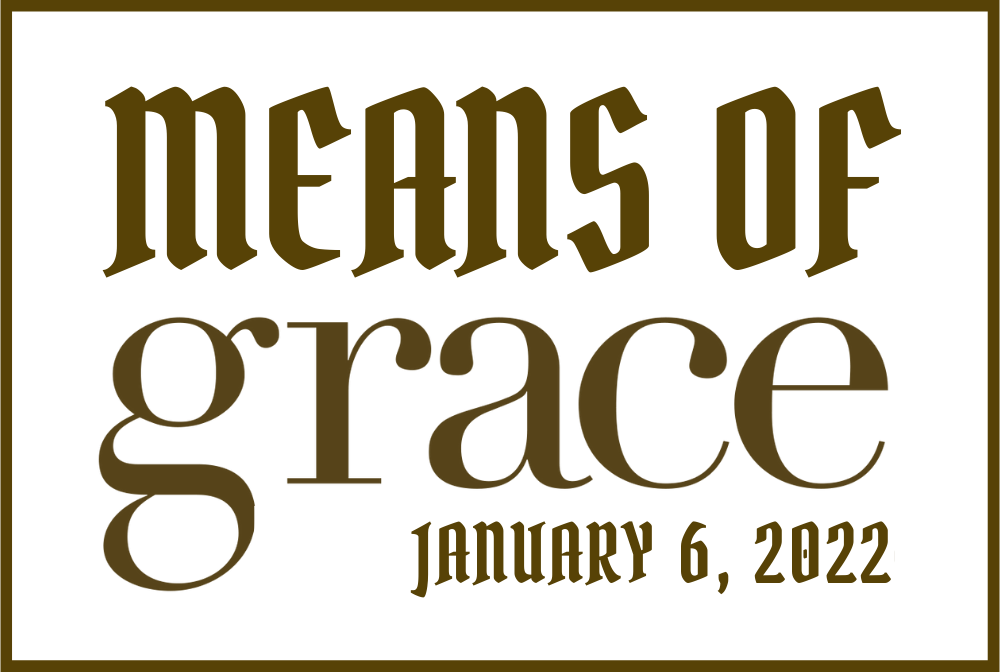Means of Grace for January 6: Bible reading, church after COVID, natural law, & more!

Welcome to another edition of “Means of Grace,” a recurring article providing links to useful resources for growing in our Christian faith!
M’Cheyne’s Bible Reading Plan
This is the first week of the new year, and a fitting time to begin a regular plan of Bible reading! There are many Bible reading plans out there which work through the Scriptures at different paces. One that I recommend (and which I’m working through in 2022) is Robert Murray M’Cheyne’s famous daily reading plan, which works through four to six chapters a day and which, if followed, will take the reader through the entire Old Testament once a year and the New Testament and Psalms twice.
We make a pamphlet version of M’Cheyne’s Bible reading plan available in our brochure rack on the resource table on Sundays. You can also download a PDF and print it here (print letter size, in landscape, double-sided and flipped on short edge).
You can also find the daily readings all organized on Bible Gateway here. And if you create an account on Bible Gateway, you can set it up to send a daily email to you with the reading!
The Five-Day Reading Plan
My copastor Andrew Davis posted this and adds these comments:
"I would like to recommend the 5 Day Bible Reading Plan. I first saw this as a recommendation by Tim Challies a few years back and I've been using it ever since. You can find the pdf printout and more here and the following is an explanation of the plan from the pdf printout.
"'This special Bible reading system allows you to read the entire Bible in one year while only reading five times a week. Five readings a week gives room to catch up or take a day off to focus on other Bible reading or spiritual disciplines, and makes daily Bible reading practical and do-able. Many people have successfully reached their goal of regular Bible reading using the Schedule and you can too!
"'The Old Testament readings are placed as chronologically as possible (even the Psalms are read where they belong in Israel’s history when feasible, and this is why some proph- ets appear to be “out of order”). The only exception is Job, probably the oldest book in the Bible, but placed at the Schedule’s end because it is hard to fit elsewhere. The New Testament readings space the Gospels out throughout the year to keep the reader constantly coming back to the life and teachings of Jesus.
"'Always do the reading in the order it appears on the Schedule. For example, if a reading from Chronicles appears before Kings, read from Chronicles first. Check off each day's reading, and then check off each week in the Weekly Progress Register. You will be amazed at how soon you are deep into the year and still reading your Bible regularly! God’s blessings rest with those who will read, understand, and live by His Word. May this guide help you to that noble end. “Thy word is a lamp to my feet, and a light to my path'” (Psalms 119:105).
Bible Reading Plans for Kids
For kids who may not be ready to tackle something as involved as M’Cheyne, here are a couple resources to help them form a habit of regular Bible reading.
Joe Carter has a three-step plan for parents to get their kids into regular Bible reading here. Don’t miss the downloadable reading chart he provides while you’re at it!
If you have a (free) esv.org account, Crossway has two Bible reading plans for kids: Through the Bible in 20 Days, and Through the Bible in 60 Days.
New City Catechism
It’s the first week of the year, and so it’s also a great time to start learning (or simply reviewing) the foundations of the Christian faith by using the New City Catechism! You can access the Catechism for free here.
There are also free mobile apps for iOS and Android (scroll to the bottom of the page to find them). As an example, here’s Week One:
Question 1: What is our only hope in life and in death?
Answer 1: That we are not our own but belong, body and soul, both in life and death, to God and to our Savior Jesus Christ.
The Church on the Other Side
A few days ago, Paul Carter (a pastor in Ontario) wrote “The Church on the Other Side: Anticipations and Concerns.” It’s an absolute must-read, and I strongly urge you all to note the “Concerns” section—because the concerns he articulates are the very concerns that have been weighing heavily on me for the past year.
An Introduction to Natural Law
This is a longer read, but Steven Wedgeworth wrote up an introduction to natural law for Desiring God. This is an area of theology that is rather underutilized in the modern church and is misinterpreted and misunderstood even by many Reformed theologians in our day, but was nevertheless an important component of Christian theology in the past--including the Reformers and those who followed them. Given its importance for Christian ethics and a Christian conception of law and politics, I've become convinced over the past year that recovering a biblical and Reformational understanding of natural law (and natural theology) is desperately needed in our day.
BAPTIZO: Blog Series on Baptism
Yesterday, on the church blog, we kicked off a series of articles looking at baptism. Here’s the first article: Who Is To Be Baptized?
Grace and peace be with you all!
- Jeff
More in Blog
August 15, 2022
Registration is LIVE for our "Zoomerang" VBS August 15-19!June 14, 2022
Means of Grace for June 14: God's Nature, Spurgeon's Evangelist, Culture War, Tradition & More!March 16, 2022
Preparing for One's Baptism Service